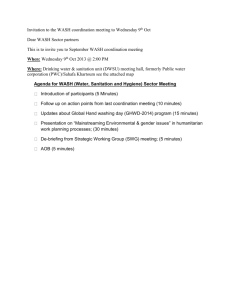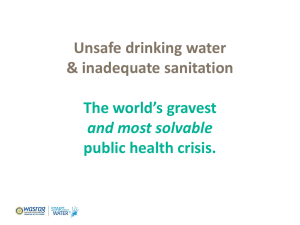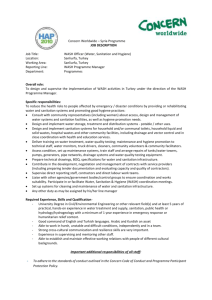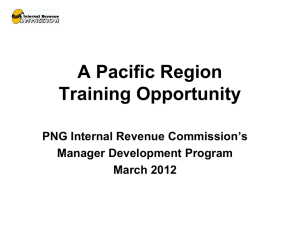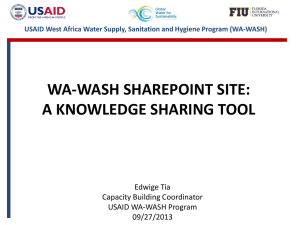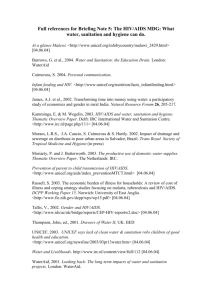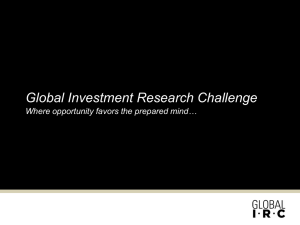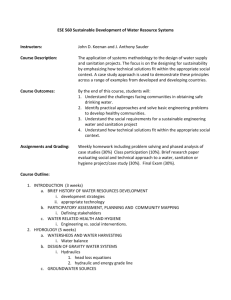Knowledge management for WA-WASH and beyond
advertisement
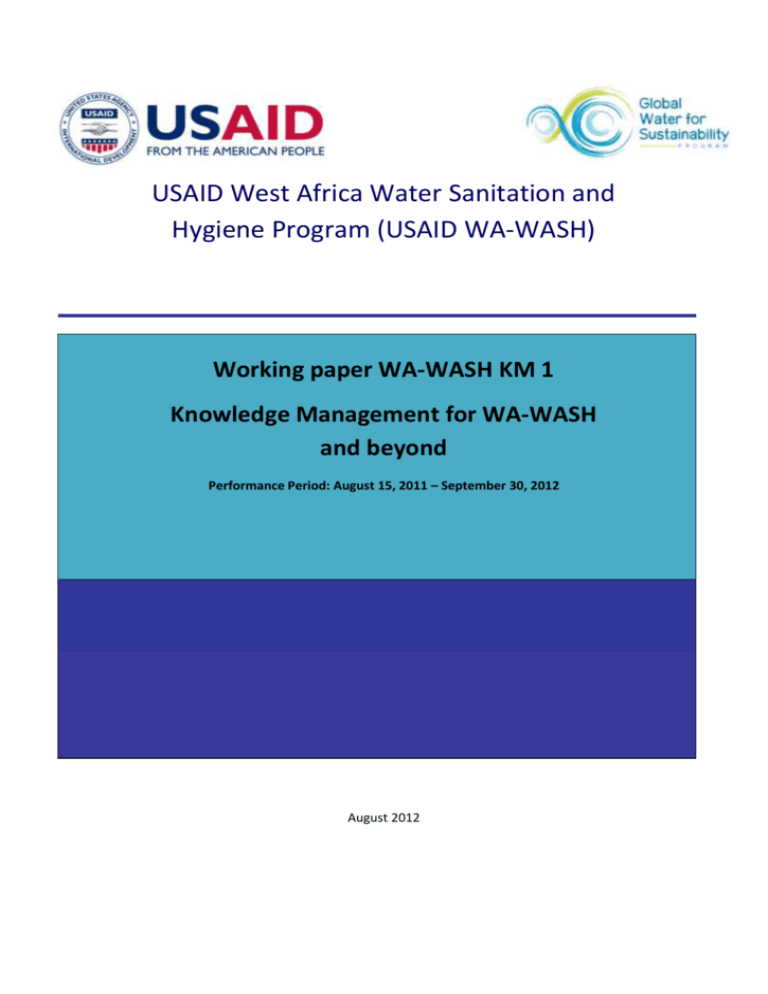
USAID West Africa Water Sanitation and Hygiene Program (USAID WA-WASH) Working paper WA-WASH KM 1 Knowledge Management for WA-WASH and beyond Performance Period: August 15, 2011 – September 30, 2012 August 2012 West Africa Water Supply, Sanitation and Hygiene (USAID WA-WASH) Program Contents Acronyms and Abbreviations .................................................................................... 2 Purpose...................................................................................................................... 2 Update September 2012 ........................................................................................... 3 Introduction ............................................................................................................... 3 On WA-WASH ............................................................................................................ 4 Sustainable WASH services 4 WA-WASH focus and context 5 Knowledge management 5 WA-WASH, USAID and GLOWS 5 WA-WASH consortium 6 KM key project processes .......................................................................................... 6 FRAME 7 Akvo 8 GLOWS website 8 WA-WASH Planning 8 IT infrastructure to support KM ................................................................................ 9 Process documentation ............................................................................................. 9 How will information finds its way? ........................................................................ 10 Theory of Change on KM ......................................................................................... 10 Box 1: The main steps in process documentation 11 Scheme 1: Theory of Change WA-WASH KM interventions 12 Discussion / Next steps............................................................................................ 12 References ............................................................................................................... 13 Pictures .................................................................................................................... 15 Picture 1: Information from / on the project, Pels / Boukerrou, November 201115 Picture 2: Project public information; Pels / Boukerrou, November 2011 17 Picture 3: Information about project activities; Pels / Boukerrou, November 2011 18 Annex ....................................................................................................................... 19 A Bbrainstorm Febr 14, 2012 on IT and KM within WA-WASH and GLOWS 19 B Eau Vive - KM Project Officer Terms of Reference 20 C Excerpt on KM: WA-WASH technical Application November 3, 2011 22 Prepared by Jaap Pels, IRC, September 1, 2012 Peer review by the WA-WASH KM Team IRC International Water and Sanitation Centre | The Hague, the Netherlands | www.irc.nl | +31(0)703044000 Page |1 West Africa Water Supply, Sanitation and Hygiene (USAID WA-WASH) Program Acronyms and Abbreviations CARE CoP FIU FLOW GIS GLOWS IRC IWA KM M&E NGO PRSP Q&A RAIN RSR SKAT Triple-S ToC UNESCO-IHE UNICEF USAID USAID/W-AFR WA-WASH WAWI Cooperative for Assistance and Relief Everywhere, Inc. Community of practice Florida International University Field Level Operations Watch Geographical Information System Global Water for Sustainability Program IRC International Water and Sanitation Centre International Water Association Knowledge management Monitoring and evaluation Non-governmental organization Poverty Reduction Strategy Paper Questions and Answers Rainwater Harvesting Implementation Network Really Simple Reporting Swiss Resource Centre and Consultancies for Development Sustainable Services at Scale Theory of Change United Nations Educational Scientific and Cultural Organization-IHE United Nations International Children's Emergency Fund United States Agency for International Development United States Agency for International Development/West Africa West Africa Water, Sanitation, and Hygiene Program West Africa-Water Initiative Purpose This working paper is written to introduce and manage expectation on the knowledge management (KM) approach within the USAID WA-WASH program. Literature – preliminary stemming from organisational sciences - suggests KM builds upon activities / interventions on a personal, organisational and sector scale. For WA-WASH the sector scale is further broadened from national to regional. Between the organisational and sector scale there is also a WA-WASH program level to address in respect to KM. In the USAID WA-WASH technical application (see annex) KM will be looked upon as a mixture of activities – e.g. the WA-WASH partner in-country activities – and discussions. The latter can shape in personal / program / organisation learning, learning alliances, reflection sessions, communities of practice etc. Whatever happens, paramount is to keep track of the explicit results – e.g. information - of these activities and dialogues. Partly this information will find its way along and piggy backing on reporting lines, but when not specifically addressed, the information will get lost. WA-WASH operates in a GLOWS environment, with USAID guidance, which also sets boundaries and shapes the playing field for KM. This working paper considers the options and possibilities. The main purpose of this working paper is to set the outlines for building the information repositories needed to feed improvement of WA-WASH activities, sharing, learning and discourse, next to preservation of these records for future beyond and outside WA-WASH use. The audience for this working paper is all WA-WASH staff. IRC International Water and Sanitation Centre | The Hague, the Netherlands | www.irc.nl | +31(0)703044000 Page |2 West Africa Water Supply, Sanitation and Hygiene (USAID WA-WASH) Program Update September 2012 This working paper contains a number of URLs that have become obsolete. The correct ones are: GLOWS website: www.globalwaters.net WA-WASH country blogs: Burkina: http://burkinafaso.globalwaters.net and admin http://burkinafaso.globalwaters.net/wpadmin Ghana: http://ghana.globalwaters.net back end: http://ghana.globalwaters.net/wp-admin Mali: http://mali.globalwaters.net back end: http://mali.globalwaters.net/wp-admin Niger: http://niger.globalwaters.net back end: http://niger.globalwaters.net/wp-admin WA-WASH calendars: Burkina Faso: https://www.google.com/calendar/embed?src=faso.wawash@gmail.com Ghana: https://www.google.com/calendar/embed?src=ghana.wawash@mail.com Mali: https://www.google.com/calendar/embed?src=mali.wawash@gmail.com Niger: https://www.google.com/calendar/embed?src=niger.wawash@gmail.com PS For all WA-WASH countries a Gmail account like Niger.wawash@gmail.com is made WA-WASH mailing lists: Mail to: wawash@googlegroups.com for all WA-WASH partners Mail to: wawashkm@googlegroups.com for KM team WA-WASH only WA-WASH public folders: See https://drive.google.com/a/irc.nl/?tab=wo#folders/0BxdfWB5tTNE7ZnR4bG5PdWFVZUk Introduction Within the USAID WA-WASH project (2011-2015) knowledge management (KM) is a cross cutting activity. The implementation of WA‐WASH will generate information and knowledge. For better sector performance, this information has to be collected, managed and made assessable, and knowledge has to be shared. For details on the WA-WASH project the reader is referred to excerpt of the WA-WASH Technical Application on activity 4.3 in the annex. This working paper elaborates on the various project management conditions and necessary start-up activities needed to make KM in WA-WASH a success. The first paragraph sets the scene and typifies the WA-WASH project. Then the project processes are elaborated on to be followed by a discussion on the IT infrastructure supporting the flow of information, connection to channels to communicate through which will lay the foundation for learning. In the next paragraph on process documentation we explain how this activity is built in the KM processes as described in the WA-WASH Technical Application. To make KM more tangible a theory of change is presented linking the WA-WASH KM activities to change, project success, e.g. better WASH sector performance. This working paper concludes with a discussion on solutions to support KM adequately and effectively, not only during, but also after the project finishes living up to the credo ‘KM in WA-WASH and beyond’. IRC International Water and Sanitation Centre | The Hague, the Netherlands | www.irc.nl | +31(0)703044000 Page |3 West Africa Water Supply, Sanitation and Hygiene (USAID WA-WASH) Program The aim of this working paper is to present key choices on processes supporting knowledge management in the USAID WA-WASH project in respect to persistence after the project is closed. Although it is said information put on the Internet cannot be removed ever, the WAWASH information collection should be organised and supported such that ‘find-ability’ beyond 2015 is secured. It is expected FUI will make the proper arrangements for this right at the start of the WA-WASH activities. On WA-WASH The primary goal of the WA-WASH Program is to increase – by building on and expanding past WAWI1 efforts in the region - sustainable access to safe water and sanitation, and improve hygiene in West Africa. The objectives to accomplish this are: i) ii) iii) iv) Supporting catalytic approaches to accelerate regional access to improved water supply / sanitation services and improved hygiene behaviours; Developing and implementing improved models for sustainability of rural and peri-urban WASH service delivery that are replicable throughout West Africa; Building synergies between WASH interventions and critical USAID / West Africa regional priorities related to food security, climate change, and sustainable resource management; Strengthening regional enabling environment and capacity for WASH to achieve WASH MDGs in West Africa. The first three objectives will be reached through selected field based activities, while the fourth will require a series of actions aimed at effectively addressing systemic challenges for sustainability of the WASH sector in Burkina Faso, Ghana, Mali, Niger and in West Africa as a whole. Knowledge management is a key element here. The conceptual approach involves a carefully coordinated set of simultaneous and sequential activities nested at multiple levels. At the community level to contribute to providing rural households with adequate year-round water supply and to market and promote the use of sanitation facilities and adequate hygiene behaviours. Consequently, WA-WASH will invest a significant proportion of effort to effectively implement and integrate a wide range of low-cost and innovative technologies for water supply and sanitation services, with a strong focus on behavioural change at the community level, needed to ensure real and sustainable improvements. Sustainable WASH services Moreover, to ensure long-term reliability and sustainability of the services provided, efforts at the community level will be complemented by researching and promoting practical and replicable models for WASH service delivery in rural and peri-urban areas. Strong focus will be placed on one of the most critical aspects of sustainability: the costs of meeting water supply and sanitation needs. To this end, innovative and viable financing mechanisms and credit models for small / medium scale water, sanitation, or hygiene activities will be researched, developed and tested. The program also calls for citizen advocacy to support the reform of key national policies and to ensure that high priority is accorded to water supply, sanitation and hygiene improvement by policymakers. Cognizant of the importance of the role of women as change agents at the community and household levels, gender issues, including advocacy and capacity building activities will be 1 West Africa Water-Initiative; WA-WASH predecessor IRC International Water and Sanitation Centre | The Hague, the Netherlands | www.irc.nl | +31(0)703044000 Page |4 West Africa Water Supply, Sanitation and Hygiene (USAID WA-WASH) Program an integral and complement to all interventions. By empowering women in water and sanitation service delivery greater sustainability of systems, gender mainstreaming actions and models will be clearly articulated in each of the interventions. WA-WASH focus and context The WA-WASH program’s focus is on countries with chronic and severe food insecurity, as well as high vulnerability to climate variability, primarily because of constant water shortages and / or droughts, but also periodic severe seasonal flooding. The program will explore and illustrate tangible linkages and intersections between food security and WASH, as well as climate changes and WASH. In this respect, the program will ensure tight cooperation and synergistic programming with USAID’s Food Security initiatives and programs. WA-WASH will also include research and planning on the sizing, design, and setting of infrastructure projects in vulnerable areas. Creating an enabling environment and strengthening WASH institutions across the region will be a core element of WA-WASH as a means to promote long-term improvements in water service delivery. This objective will be reached through a strategic set of activities focused on institutional assessment and strengthening, capacity building, and knowledge management in West Africa as a whole. As a first step the program will systematically assess the capacity and potential of all regional institutions operating at various titles in the WASH sector. Capacity-building activities will then target institutions and organizations at various levels (local, national and regional level, organized civil society, academic institutions). Mechanisms to achieve the capacity building objectives will include technical assistance, development of training materials, workshops, trainings of trainers and academic research. Knowledge management In the course of its implementation, the WA-WASH project will generate information and knowledge. This information will be created, collected, managed and disseminated. Knowledge acquired through lessons learned during ground-level interventions, coupled with the results of national policy and institutional assessments will be shared among WAWASH partners as well as other practitioners and national and international water institutions. A framework for KM will be developed. Finally, regional efforts will also reach out and include private sector partners to expand and deepen the impact of development assistance by linking WA-WASH partners, practitioners and public sector water institutions with the resources, expertise, and creativity of private sector. The KM component aspire to enhance the capacity to better learn, share and manage information and knowledge in the WASH sector; whether existing or new. Activities are designed to promote long-term sustainability of program interventions. The hardware components will be accompanied by capacity building activities at all levels to ensure basic operation and maintenance at community level, training and retention of adequate number of sector professionals, and effective overview and access of information to enable decision-making by the public. A substantial emphasis will be placed on documentation, synthesis, and sharing of experiences within and beyond WA-WASH countries. Major efforts will be undertaken to research, refine and diffuse service delivery models appropriate and effective in the West African context. WA-WASH, USAID and GLOWS WA-WASH reflects specific policy objectives of the United States foreign assistance programs both in terms of goals set and approaches adopted. In particular, following the ‘Senator Paul Simon Water for the Poor Act of 2005’’ (PUBLIC LAW 109–121—DEC. 1, 2005), IRC International Water and Sanitation Centre | The Hague, the Netherlands | www.irc.nl | +31(0)703044000 Page |5 West Africa Water Supply, Sanitation and Hygiene (USAID WA-WASH) Program U.S. development aid has designated access to water and sanitation as a high priority. The WA-WASH approach has been designed to respond directly to USAID’s framework for action in the WASH sector. This approach identified three pillars required for sustainable access and use of improved water supplies and sanitation: “Access to appropriate hardware […]; behavior change and hygiene promotion […] and enabling environment (improved policies, institutional support, community organization, finance and cost recovery, and public-private partnerships for improved water supply, sanitation, and hygiene)”2. On the same note, the assistance objectives established by the program reflect the priorities set by the four countries (Ghana, Mali, Niger and Burkina Faso) in their Poverty Reduction Strategy Papers (PRSP). All four West African countries targeted by this project are recently experiencing variations in climate that have serious implications for the ability of poor populations to access sufficient and sustainable supplies of freshwater for both domestic and productive uses and to protect these limited assets from the ravages of extreme climate events. To address these problems, the WA-WASH project will have a climate change adaptive and resilience component. GLOWS will concentrate its WASH related adaptation efforts to support capacity building and help decision, policy-makers, project managers, adaptation practitioners, and local communities acquire the necessary knowledge to make informed decisions. We will also incorporate pilot demonstration projects, information sharing, training and leveraging US government funds to promote climate adaptation measures. Future approaches which are needed to address climate change issues will be integrated in WA-WASH project activities with an emphasis on mitigation and adaptation methodologies and techniques which affect the water, sanitation, and hygiene sectors in particular and the broader economy in general. WA-WASH consortium The WA-WASH Program will be implemented by a consortium of capable organizations and will be managed by a skilled team of professionals with experience in the scientific and socioeconomic areas of program activities. The organizations responsible for the implementation of the program, under the leadership of Florida International University (FIU), are WinRock International, WaterAid, CARE, the International Water Association (IWA), the Rainwater Harvesting Implementation Network (RAIN), the UNESCO-IHE Institute for Water Education, the IRC International Water and Sanitation Centre (IRC), SKAT, and Building Partnerships for Development (BPD). A select number of activities will be coordinated with other international and local partners. This team will be complemented by a group of international advisors from the GLOWS Program and by national specialists contracted to execute specific tasks. In addition, we will seek to take advantage of the presence in West Africa of the multiple donors and implementers who are working in the water, sanitation, hygiene, food security, climate change, and environmental sectors to share lessons learned and best practices which could enhance the implementation of this project. KM key project processes For KM to succeed, it depends on clear management of secondary processes within WAWASH, more specifically the processes around: 2 U.S. Agency for International Development and Bureau of Oceans, Environment, and Science (2009), Addressing water challenges in the developing world: a framework for action, An Annex of the 2008 Report to Congress for the Senator Paul Simon Water for the Poor Act, pp. 4-5. IRC International Water and Sanitation Centre | The Hague, the Netherlands | www.irc.nl | +31(0)703044000 Page |6 West Africa Water Supply, Sanitation and Hygiene (USAID WA-WASH) Program 1.Storage / access of project reports / documents / success stories etc. 2.Updating the GLOWS repositories / website 3.Disseminating information in general, e.g. clearance 4.Disseminating information on WA-WASH blog(s) / social network / Q&A 5.Publishing information on Akvo / FRAMEweb / other (when chosen for) 6.Planning The above can be captured under the ‘what, why, when, who and how – information’ questions for the WA-WASH project. The documents concerned under 1 and 6 all have a digital nature. That implies copying is hardly a cost component. However, storage of an original, a ‘mother version’, does incur handling cost. A second aspect to manage is access. People within WA-WASH work within different time and places and thus exchange of documents will be based on email primarily and hard copies will be locally produced. The latter process – exchange by email - is not suitable for a planning document which will probably be under constant revision. For this it is needed to organise real-time access. With reference to Picture 1 (see pictures), monthly reports and other documents go by email to FIU regional office (RO). The RO staff will archive all files on a RO-server with back-up facility and no ‘open’ connection to Internet. The KM team (see Annex 1) will get VPN (virtual private network) access to selected folders. The KM team will need access to be on top of activities and progress by WA-WASH partners and plan KM activities / process documentation / versioning as appropriate. Files need to be ‘OK-ed’ by FIU (issue 3 mentioned above) to go public. Number 2 – updating the GLOWS website – and 3 – clearing documents before they go public - are issues for FUI. It is expected FUI will publish procedures for this. For WASH KM to succeed it is paramount information is disseminated – as publicly as possible; number 4 above. This will be done using a public repository for documents (various formats like doc, PPT etc), video, pictures and audio; through a social network and a question & answering system. For this to materialise WA-WASH could run its own systems be it that they will be not maintained after the program closes. This way ‘KM in WA-WASH and beyond’ will not succeed. To address this some research has been done on the possible use of FRAME (http://frameweb.org) and Akvo services (www.akvo.org). FRAME The WA-WASH FUI Burkina faso Regional Director proposed to examine software at http://FRAME.web which is a peer to peer network of Natural Resource Management practitioners. The site is sponsored by the US Agency for International Development (USAID), but it is open to all development practitioners regardless of donor or implementing agency. As a Community of Practice FRAME web focuses on three main types of knowledge sharing: Tools and Resources - research, success stories, best practices, newsletters, videos, links to USAIDs Resource Management Portal, etc. uploaded by users; Discussions - questions, answers, and comments related to Community topics posted by users; Network - find and follow other members with similar interests, read blog entries, and email experts. Specific pro- and cons of using FRAME for WA-WASH: IRC International Water and Sanitation Centre | The Hague, the Netherlands | www.irc.nl | +31(0)703044000 Page |7 West Africa Water Supply, Sanitation and Hygiene (USAID WA-WASH) Program The service is free of charge / USAID funded which might last after the WA-WASH program ends. WAWI reference at http://gis.frameweb.org/searchActivity.htm?hdnObjectID=523#Results Has a Geo Explorer which might be useful for WA-WASH GIS activities. Links to other natural resource projects. Counterproductive could be: Is not specific to WA-WASH. The social network goes beyond WA WASH which might be a draw-back / hurdle for WA WASH people to join because they could be worried by the amount of topics and information. Akvo Akvo creates open source web and mobile software, and builds networks of skilled partners that can change the way development aid is allocated and reported. This is important, because it improves the way projects are implemented in some of the poorest parts of the world, making them more effective, efficient, sustainable and visible. Many partners focus on water and sanitation, but Akvo now also covers health, education, economic development and IT projects. The Akvo system is designed to appeal to a new generation, who want to see online where their money is being spent. In Akvo, money flows quickly because donors choose what to fund and follow progress online. Knowledge is shared and people can use these storylines to build exciting new campaigns and networks. Akvo is a non-profit foundation with staff in the Netherlands, Britain, Sweden and California. The Akvo platform is open source to encourage others to build on and improve these tools, or adapt the platform for other purposes. Specific pro- and cons in relation to WA-WASH: Costs are around US $ 50K a year; also beyond the project. Systems are ready, look nice and appealing. Akvo will install plug-ins for a social network and Q&A; BuddyPress and OSQA respectively. Some WA-WASH partners are already on Akvo (RAIN, IRC). GLOWS website A third possibility would be to (re) vamp the GLOWS website (http://www.globalwaters.net). Currently this site lacks the functionality and it seems to consume a lot of bandwidth. If this opportunity is chosen, quick action is needed such as the webmaster of FIU, the Regional Director and the WA-WASH KM principal (Pels, IRC) sitting together to develop a plan and budget. As far as known now, FUI will invoice GLOWS e.g. WA-WASH for services such as offered by Akvo (amount not known and will depend on the amount of work required). WA-WASH Planning A critical success factor is a real time accessible planning of WA-WASH activities. Apart from a web based system this will require key contacts and responsible staff in the WA-WASH partner organisations. As for systems SmartSheet (http://www.smartsheet.cm) seems a very good candidate for being web-based, multi-user and affordable (between cost ranges US 425 and 1249/year for schools NGO etc.). Major problem is off-line working which is not IRC International Water and Sanitation Centre | The Hague, the Netherlands | www.irc.nl | +31(0)703044000 Page |8 West Africa Water Supply, Sanitation and Hygiene (USAID WA-WASH) Program possible. MS Project is a less good candidate because it is personal computer based and files have to be exchanged; which is a source of delay, update-errors and mis-communication. IT infrastructure to support KM On the above mentioned systems there is an (information) technical (IT) angle, e.g. uptime, back-up and performance. This IT component, the backbone upon which the various applications run and repositories will be stored for access, needs to be addressed around systems for: a. Document repository b. Web-logs (Blog(s)) c. Social network d. Question & Answer application e.Planning In principle the document repository is organised by FUI and or FUI Regional Office (RO). For the sake of sustainability this repository needs to be archived / consolidated or kept up-todate / accessible after the WA-WASH program finishes in 2015 and owned by ‘in-region’ organizations. The lessons learned from investigating WAWI I and II is that no informational legacy outside partial ones within WAWI partners is to be found. WA-WASH takes these lessons to heart and thus some form of web-based public accessible document repository must be organised. The three mentioned options above (Akvo, FRAMEweb and FUI) all hold this functional possibility, but a choice must be made as soon as possible. For web-logs (Blog(s)), a social network and a Question & Answer application, FRAME and Akvo are suitable. FRAME and Akvo both have the disadvantage of not being dedicated systems, be it that Akvo is more WASH oriented, where-as FRAME is natural resources oriented. FRAME holds the advantage that it is free of charge (for the time being) and the disadvantage that the functionality and lay-out is standard and fixed. Within Akvo there is more space for dedicated project and partner pages that are branded for WA-WASH. When starting with the GLOWS website branding and dedication will be no issue. At Akvo and GLOWS there are costs involved. Process documentation Development work involves complex processes of social change and institutional transformation. Most often, the road followed is not straight – as intended in the initial intervention design – oftentimes ruts, bumps, curves, dead‐ends, as well as new routes emerge along the way. Change is a non‐linear and unpredictable process. “Planned intervention is an on‐going, socially constructed and negotiated process, not simply the execution of an already specified plan of action with predictable outcomes” (Long, 1995, p. 127). Planned recurrent documentation and reflection during the course of an intervention – rather than at its completion – can help bring to the surface unforeseen issues, providing new insights into initiatives (also referred to in here as interventions). By recording stories of change about how things were done, what worked, and what did not, individuals involved in an intervention can learn, improve upon the intervention and share lessons with others. IRC International Water and Sanitation Centre | The Hague, the Netherlands | www.irc.nl | +31(0)703044000 Page |9 West Africa Water Supply, Sanitation and Hygiene (USAID WA-WASH) Program Understanding this process and adapting development interventions based on findings is crucial to achieving broad development goals more realistically and effectively. Process documentation is generally understood to be a term for using a set of tools for documentation and learning during the course of development interventions. It will include attempts to capture the factors (expected or otherwise) that affect the change process that the intervention is aimed at. Process documentation is guided by and provides feedback on a certain programme logic or ‘theory of change’, i.e. the underlying assumptions and explicit ideas about how change is expected to take place in a given initiative. How will information finds its way? WA-WASH does not start from scratch but builds for example on the experience of its predecessor projects WAWI and Ghana water initiative, but also on good practices of other WASH projects and programmes. Current available knowledge / information and network of knowledge-able people must come from the partners themselves. The WA-WASH partners should ‘know what they are doing’ based on available information and knowledgeable partner staff. The KM staffs hired in country are going to be responsible to start and sustain a weblog for a flow of information on WA-WASH relevant issues. This can be information they find / run into, short write-ups of discussions they had with WASH sector staff and / or WA-WASH partner staff or announcement and reports on sector meetings. In principle they will work on a country level but through the KM team cross fertilisation will follow. The terms of reference for the KM in country staff at IRC partners Eau Vive and Resource Centre Ghana can be found in the annex. On the same note information and references on what activities partners under the WAWASH banner do must link to the geographic information system (GIS) system. That would also be a nice going in position to keep track of updates on sustainability. Akvo ‘really simple reporting’ (RSR) approach can be the example here. For the above it is paramount the IRC partner, WA-WASH and GLOWS systems integrate seamless. RSS is the paramount technology to establish that. The information repositories will be available for both the primary and secondary target-groups as mentioned in the ‘WAWASH branding and marking plan’. Primary Audience: the beneficiaries of the project are rural poor in targeted geographic regions. These beneficiaries, along with government and local community leaders, are the primary audience. Secondary audience: government offices and organizations working on water issues and management in the various West African countries will receive information and will participate in capacity building and KM activities. Theory of Change on KM Capturing and analysing processes of change requires observing (watching and listening), asking questions (especially by interviewing stakeholders about their perceptions) and learning (about the local context and the effects of that context on the intervention and its outcomes). Before all these are to take place, process documentation requires having a good understanding of the change processes that an intervention aims to support or bring about. More specifically, to decide what should be documented and how, a process of reflection – on what the expected changes are – needs to take place. IRC International Water and Sanitation Centre | The Hague, the Netherlands | www.irc.nl | +31(0)703044000 P a g e | 10 West Africa Water Supply, Sanitation and Hygiene (USAID WA-WASH) Program The expected changes and underlying assumptions about how the change will be achieved through the intervention are called the ‘theory of change’: an expression of the expected / apparent relationships between actions and hoped‐for results. These provide direction and focus for process documentation. Making the theory of change explicit is the first step in developing a process documentation plan, as described in Box 1 below. It provides a clearer picture of what the initiative aims to accomplish and how this is expected to happen. Reflecting will reveal who the key stakeholders are, which processes are expected to lead to which changes and can also reveal gaps or questions that are relevant to observe and document. Box 1: The main steps in process documentation Developing a structured and focused way of capturing the change process requires taking several steps. These include: 1. Identifying the theory of change and operational assumptions behind the initiative. 2. Capturing systematically information related to the theory of change and operational assumptions. 3. Organising information in such a way that stakeholders can reflect and learn about the process. 4. Analysing information by looking at common themes, trends and patterns and placing findings in the context of the project and the project’s theory of change. 5. Disseminating information in a format (and at a pace) that is useful and comprehensible. 6. Using the findings to improve the approach, strategy and adjust theory / assumptions about change. The first step is to identify a theory of change (ToC) indicating how the various activities / actions / dialogues will lead to the desired outcome. For KM the ToC is given and explained below. As can be seen there is not much ‘WA-WASH about KM. At the start KM is about collecting the context the content and creation of an information repository. Step two is locating and connecting the people involved building a social network. Through facilitation and process documentation the build capacity has to lead to ‘beyond WA-WASH’ improved performance of the WASH sector. Narrative The implementation of WA‐WASH will generate information and knowledge. For better sector performance, this information has to be collected, managed and disseminated, and knowledge has to be shared. IRC developed the WAWI knowledge management and communication strategy. This strategy will be adapted and used for WA-WASH. The crucial approach on KM within WA‐WASH will be to document and support the exchange of information and dialogues (i.e. on the Triple‐S platforms or on capacity reinforcement of sector institutions) and activities (i.e. drilling boreholes) right from the start and actively re‐package information to address various and targeted audiences using ICTs where appropriate. When possible, WA‐WASH interventions will be re‐visiting post implementation (including relevant WAWI activities) to assess the progresses made. In the end the loop is closed because improved performance and capacity will improve the dialogues and activities. From the information repository information and knowledge (or references to knowledge-able people) can be pushed towards the dialogues and the social network to encourage learning for better sector performance IRC International Water and Sanitation Centre | The Hague, the Netherlands | www.irc.nl | +31(0)703044000 P a g e | 11 West Africa Water Supply, Sanitation and Hygiene (USAID WA-WASH) Program Scheme 1: Theory of Change WA-WASH KM interventions Discussion / Next steps Foremost the establishment of a KM team for the WA-WASH program needs to be a next step. Currently (February 2012) the terms of reference is ready and IRC partners are looking for staff to hire. Next, the KM team must be complemented with ‘KM linking pins’ in the WA-WASH partner organisations. Currently (February 2012) it is unclear who of the partners has started and thus can be invited to join the KM team. The two actions, hire staff and appointing linking pins, will be followed by a start-up workshop on how to address KM with the WA-WASH program. An IT platform will be needed for WA-WASH, but also for GLOWS to accommodate: - Document repository - Blogging - Social network - Planning - Real time access of up-to-date overview of what happens where by whom and when. - GIS In the brainstorm February 2012 the above issues have been talked about and addressed (see Annex). In the above text the below choices presented itself possible: A. Go with Akvo => US $ 50.000 / year estimated B. Go with GLOWS => US $ 50.000 plus / year estimated C. Merge GLOWS to Akvo D. Host own WP / BP / OSQA E. Go with FRAMEweb Form the brainstorm it became clear GLOWS will build a ‘GLOWS portal’, choice D, in fact IRC International Water and Sanitation Centre | The Hague, the Netherlands | www.irc.nl | +31(0)703044000 P a g e | 12 West Africa Water Supply, Sanitation and Hygiene (USAID WA-WASH) Program emulating and / or encompassing functionalities available through the IRC platform, the Akvo platform and FRAMEweb. That portal will be developed gradually and KM staff (for sure the WA-WASH KM team but perhaps also partner staff) and FIU Burkina Faso office staff will work with the FIU IT staff and GLOWS managers together. Up to now the development has been very organically or agile and there is no reason to change that for the moment. FUI took a decision to organise the IT infrastructure through FUI. Blog In respect to IT needed for KM activities this means that the country WASH blogs can be used to post blog-posts, attach files and serve a dashboard to mailing list and the social network. - http://WASHBurkinaFaso.wordpress.com 3 http://WASHGhana.wordpress.com http://WASHMali.wordpress.com http://WASHNiger.wordpress.com Export by RSS (example http://washburkinafaso.wordpress.com/feed) of the feeds can be fed into to GLOWS portal under the WA-WASH section. Importing allows the entries to be formatted in the appropriate format with the appropriate look and feel as prescribed by USAID. PS With the same ease and arguments a choice can be made for Blogger (Google product). Google mailing / calendar Corresponding Google mailing / Q&A lists and calendars have been setup already. Also Twitter accounts and Facebook / LinkedIn groups exist already for use. In the ToR of the people hired as KM consultants it is written how to use these tools in the light of WA-WASH KM. Social network It remains to be seen how this will be accommodated by the GLOWS portal. References Da Silva (2011) Documenting change: An introduction to process documentation C. da Silva Wells, E. Le Borgne, N. Dickinson and D. de Jong (2011) Accessed 20111201 http://www.irc.nl/redir/content/download/166216/655538/file/47_OP_Documenting _change_introduction_process_documentation_2011.pdf Kelly-Mitleton (2005) A Complexity Approach to Co-creating an Innovative Environment World Futures Journal: Special Issue on Complexity and Innovation, 2005, Eds: Nolas S.M., Garcia-Lorenzo L., Zeeuw de G., Sell-Trujillo L., Accessed 20111201http://psych.lse.ac.uk/complexity/Papers/World_Futures_article1.pdf 3 It might be needed to work with WA-WASHBurkinaFaso.wordpress.com because of commercial reasons (no advertisement) and branding issues trickling down from USAID. PS http://wawashburkinafaso.blogspot.com etc. is also available; working with Blogger might be better in respect to Google Apps and services. IRC International Water and Sanitation Centre | The Hague, the Netherlands | www.irc.nl | +31(0)703044000 P a g e | 13 West Africa Water Supply, Sanitation and Hygiene (USAID WA-WASH) Program Long (1995) Sociological perspectives on agrarian development and State intervention. In: Hall, A. and Midgley, J., 1995. Development policies: sociological perspectives. pp 109‐133. Manchester andNew York: Manchester University Press. Nolas (2006) WP 152 Land, F. Nolas, S.M. Amjad, U. The ethiscs of Knowledge Management IJKM, 3 (1), 1-9, January-March 2007 Accessed 20111201 http://is2.lse.ac.uk/wp/pdf/WP152.PDF Pels (2010) Intake report West Africa Water Initiative [WAWI] : knowledge management project : final version, September 2010 (2010) Pels J. (2010) Accessed 20111201http://www.washdoc.info/docsearch/title/173701 Pels (2010) Knowledge management and communication strategy : West Africa Water Initiative Knowledge Management project (2010) Pels, J. Accessed 20111201 Pels IRC (2011) http://www.washdoc.info/docsearch/results/?txt=pels Accessed 20111201 WAWI IRC (2010) http://www.washdoc.info/docsearch/results?&txt=wawi Accessed 20111201 IRC International Water and Sanitation Centre | The Hague, the Netherlands | www.irc.nl | +31(0)703044000 P a g e | 14 West Africa Water Supply, Sanitation and Hygiene (USAID WA-WASH) Program Pictures Picture 1: Information from / on the project; brainstorm Pels / Boukerrou, November 2011 Process: - Monthly reports and other documents go by e-mail to FIU regional office (RO). IRC International Water and Sanitation Centre | The Hague, the Netherlands | www.irc.nl | +31(0)703044000 P a g e | 15 West Africa Water Supply, Sanitation and Hygiene (USAID WA-WASH) Program - RO will archive all files on a RO-server with back-up; no ‘open’ connection to Internet. - KM team will get VPN (virtual private network) access to selected folders. - Files need to be ‘OK-ed’ by FIU to go public; FUI to develop working instructions. IRC International Water and Sanitation Centre | The Hague, the Netherlands | www.irc.nl | +31(0)703044000 P a g e | 16 West Africa Water Supply, Sanitation and Hygiene (USAID WA-WASH) Program Picture 2: Project public information; brainstorm Pels / Boukerrou, November 2011 Needed: blogs, social network and document repository. GLOWS FIU: will charge the project; functionality start from scratch; quality now is low; bandwidth-bad . Akvo.org will charge the project; pro: newest technology WordPress / BuddyPress; partner pages; project pages. USAid FRAME; Free but limited functionality; status unknown / questionable (see dates ); based on Tomoye / NewsGator and USAid is a customer FUI RO to find budget line. IRC International Water and Sanitation Centre | The Hague, the Netherlands | www.irc.nl | +31(0)703044000 P a g e | 17 West Africa Water Supply, Sanitation and Hygiene (USAID WA-WASH) Program Picture 3: Information about project activities; brainstorm Pels / Boukerrou, November 2011 Needed: real time access to planning activities. MS project is not good enough for web access; file sharing will invoke error prone process; better to use web-based SmartSheet. FUI RO to look into this and make arrangement. Needed is country coordinator and partner representative to have access to add / edit (School: Team $425 / year). IRC International Water and Sanitation Centre | The Hague, the Netherlands | www.irc.nl | +31(0)703044000 P a g e | 18 West Africa Water Supply, Sanitation and Hygiene (USAID WA-WASH) Program Annex A Minutes brainstorm Febr 14, 2012 on IT and KM within WA-WASH and GLOWS Attended by: Maria Donoso, FIU, Miami Director GLOWS-FIU Lakhdar Boukerrou, USAID WA WASH Regional Director GLOWS-FIU Lanakila (Ku) McMahan, FIU Miami Jaap Pels, IRC, The Hague Missing but mentioned: Ryan Stoa, FIU, Miami Various WA-WASH FIU BF staff Topic Information management for WA-WASH and its relation to GLOWS Minutes a la twitter Ku initiated at 20:30 CET the call and repeated pieces of conversation to Lakhdar when needed. Jaap sketched out how KM is developing within WA-WASH; in staccato: - ToR KM staff in WA written en being used to hire staff - ToR describes how KM staff will feed an WASH country information flow blog - ToR describes how KM staff should network in the country WASH sector - Blog postings will be the principle information carrier Maria explained GLOWS is on the brink of using a portal where: - Development is according agile / emergence principles - Jaap will be invited as co-developer - Focal point will be Ryan, when due co-managing with a more web-savvy interested person Jaap suggested WA-WASH FIU BF to be invited as co-developer. Lakhdar endorsed that idea and stressed the connection in BF would be good. Jaap expressed he had the impression the RSS feeds form the WASH country blog would be simple integrated in the GLOWS portal - Content can be exported by RSS, which can be imported into almost any portal (CMS) PS A CMS without RSS import is non-state of the art. Example: http://www.mywash.org/group/washsanitationhygiene where the RSS from the SanitationUpdates blog is imported into a social network site. Maria stated that partners will be involved and have access where possible / needed: - FIU tech departments are involved in the GLOWS portal development - There will be a portal master IRC International Water and Sanitation Centre | The Hague, the Netherlands | www.irc.nl | +31(0)703044000 P a g e | 19 West Africa Water Supply, Sanitation and Hygiene (USAID WA-WASH) Program - All partners can / could have a mini-portal within the GLOWS portal Lakhdar saw an editor’s role for FIU BF to approve documents / information for the public part of the portal As for branding, Jaap will share URLs with GLOWS staff to check and advice on compliance with USAID. Jaap raised the issue of planning activities. Maria mentioned staff will be / is hired to operate a database for GIS coordinates which can be used to store 'activity sheets'. Jaap urged for communication channels to be opened on that development, not in the least because the development of the portal seemed based on oral exchange. Maria expressed the hope to have a glowing cyberspace presence. The meeting closed at 21:00 CET Jaap has enough information now to finish the WA-WASH KM WP 1: - The GLOWS portal initiative emulates / encompasses functionality of IRC, Akvo and FRAMEweb. - The WASH country blogs by WA-WASH KM staff must be importable through RSS into the GLOWS portal. - Jaap and WA-WASH FIU BF staff will be invited to team up with GLOWS / FIU to codevelop the portal. - Editorial management of the portal will be done by WA-WASH FIU (BF). - GLOWS FIU (BF) will as part of their communication prerogative guide USAID branding. B Eau Vive - KM Project Officer Terms of Reference IRC International Water and Sanitation Centre (IRC) expects Eau Vive to produce a complete advertisement for the Knowledge Management (KM) officer vacancies in Burkina Faso, Niger and Mali on the basis of the specifics provided below. See the annex (in English) for a description of the USAid funded West Africa - Water, Sanitation and Hygiene Programme 2011-2015 (WA-WASH) and the cross cutting component on KM. Introduction (Eau Vive to adjust to their organizational requirements) Eau Vive is looking for project officers to help shape Eau Vive’s knowledge management and coordinate the Mali / Niger / Burkina Faso WA-WASH programme knowledge management component. The project officers will be member of the WA-WASH KM team consisting of national staff and IRC International Water and Sanitation Centre KM officers. Eau Vive is looking for officers with the qualifications stipulated below. Purpose and responsibilities IRC International Water and Sanitation Centre | The Hague, the Netherlands | www.irc.nl | +31(0)703044000 P a g e | 20 West Africa Water Supply, Sanitation and Hygiene (USAID WA-WASH) Program Coordinate the in-country knowledge management activities for WA-WASH; Co-manage the Eau Vive country office knowledge management plan; Ensure integrated paper, Internet and face-to-face based communication. Specific tasks include: keeping track of the country WASH calendar; network with relevant WASH stakeholders at local, (sub)national and regional levels; co-facilitate a country / West Africa social network of WASH stakeholders; map the WASH sector at country / regional level; scan news-channels (hard copy and web) on WASH news; regularly publish on WASH through WA-WASH channels and make information flow through blogs (e.g. washmali.wordpress.com / washniger.wordpress.com / washburkinafaso.wordpress.com / washghana.wordpress.com); report on on activities as per WA-WASH guidelines; comply with Eau Vive rules and regulations. Skills, experience and attitude The profile of the knowledge management officers we are looking for should ideally include the ones listed below. Candidates that miss some of the capacities listed, should be willing to acquire these at the beginning and throughout the WA-WASH programme. Attitude Work independently as a member of a tight KM team within the much larger multistakeholder WA-WASH programme; initiate / facilitate learning processes through information management and knowledge sharing; have or acquire a learning and sharing attitude. Typical background Social sciences / Media; interest in practical, governance and regulation issues of the WASH sector; being familiar with the WASH sector in Mali / Niger / Burkina Faso is an advantage. Language skills Fluent in French; preferably familiar with one / more local languages; English reading and preferably also basic speaking and writing. Research and writing Able to producing summary work outputs in French; provide English translations; able to map the WASH sector; Keeping a daily diary and based on this blog post on activities and developments of WA-WASH activities and dialogues. Document activities for formal reporting (WA-WASH programme requirement). Facilitation / Presentation / Process documentation IRC International Water and Sanitation Centre | The Hague, the Netherlands | www.irc.nl | +31(0)703044000 P a g e | 21 West Africa Water Supply, Sanitation and Hygiene (USAID WA-WASH) Program Able to facilitate write shops; to facilitate knowledge sharing events; to moderate discussions; to lead process documentation; to present progress at major programme events. Internet based communication and networking Able to or willingness to learn various online communication and networking tools and to actively network with programme contacts on a dedicated social network. Audio-visual documentation Basic skills in audio-visual documentation and willingness to enhance these skills throughout the programme; familiar with uploading and publishing audio-visual material on the web. Travelling Able to regularly and for longer periods travel in-country and willing to travel abroad. Contract Contract as per Eau Vive conditions; Availability as soon as possible (contract between IRC and Eau Vive expected during Q1 2012); Operational and hierarchical reporting to Eau Vive management; Functional reporting for the WA-WASH KM component to the KM team coordinator. C Excerpt on KM: WA-WASH technical Application November 3, 2011 Implementing partner: IRC (KM in WA-WASH and beyond) and FIU (Water Information Summit and M&E) Activity 4.3 - Regional WASH Knowledge Management / Monitoring and Evaluation (M&E) 4.3.1 Managing Knowledge within WA‐WASH and beyond The implementation of WA‐WASH will generate information and knowledge. For better sector performance, this information has to be collected, managed and disseminated, and knowledge has to be shared. Figure 2 depicts the framework for knowledge management (KM) processes used for the WAWI knowledge management and communication strategy (IRC, December 2010). That strategy will also be used for WAWASH. The crucial approach on KM within WA‐WASH will be to document the dialogues and activities (i.e. Triple‐S platforms, capacity reinforcement of sector institutions, WASH and climate change workshops, national WASH platforms, low cost borehole efforts, MUS implementation, CLTS/Sanitation marketing., etc.). Documenting will be done right from the start and information will be actively re‐package to address various and targeted IRC International Water and Sanitation Centre | The Hague, the Netherlands | www.irc.nl | +31(0)703044000 P a g e | 22 West Africa Water Supply, Sanitation and Hygiene (USAID WA-WASH) Program audiences within and outside the WA-WASH consortium. A KM team (Figure 3) will take the lead. Figure 2. Diagram of Knowledge Management framework The cyclic process in the KM framework in Figure 2 typically encompasses the following steps: 1.Members of a WA‐WASH project team and KM team will jointly reflect on what they have learned in dialogues and / or activities and agree on documentation and messages to create. This is the ‘process documentation’; 2.The KM team analyses, manages, assembles, translates, and aggregates WA‐WASH materials in such a way that they are useful to different audiences. This is referred to as the ‘versioning’; 3.The KM team creates an environment (i.e. social networks, central repository) and both input and output mechanisms (referred to as “pull and push mechanism”) so that information / documentation is accessible to those who need them; feeding lessons learned back into dialogues. To disseminate the lessons learnt, we will seek cooperation from WA-WASH consortium partners, particularly from Water Aid regional training centres and national platforms like the resource centres in Ghana and Burkina Faso. It is expected that the WA-WASH assessment plan (activity 4.1) and the contextual analysis of the WASH sector (activity 4.4) will target relevant audiences. WA-WASH lessons are expected to be used in IRC International Water and Sanitation Centre | The Hague, the Netherlands | www.irc.nl | +31(0)703044000 P a g e | 23 West Africa Water Supply, Sanitation and Hygiene (USAID WA-WASH) Program capacity building (activity 4.2). Because knowledge sharing essentially takes place through interpersonal exchange, we will build a community of practice4 supported by social network tools5. A wiki workspace for WA‐WASH partners6 will be running for quick and easy information sharing. To support news and knowledge sharing within WA‐WASH partners we will propose an e‐mail list through Google groups or a similar interface. We will also deliver and manage a website7 based on the IRC framework. Local WA‐WASH staff will be trained on using the framework and tools for knowledge management, process documentation, and communication. Figure 3. Diagram of KM team in WA-WASH consortium A start‐up a professional staff meeting is envisioned for February 2011 bringing together the IRC KM staff, local consultants, partner staff and (local) WA‐WASH staff to finalise the strategy, processes and formats to be used and plan activities and outputs. It will also mark the start of the KM team. It is to be expected that the WA-WASH activity planning will need to be updated on a regular basis and it is expected that local WA‐WASH offices will play a major role in KM and communication activities. Finally, all KM efforts will be seamlessly integrated with the geo-referenced WAWASH program monitoring and reporting system (Section 2.6), so that ongoing learning during project implementation can be used for adaptive management and work planning, as well as contribute to overall sector learning. This includes the results of Sustainability Check audits as well as application of other innovative technologies to track WASH services sustainability. 4 Community of practice see http://en.wikipedia.org/wiki/Community_of_practice See http://en.wikipedia.org/wiki/Social_network and http://www.mywash.org/group/wawash 6 The Wiki workspace can be found at : http://mywash.net/wawash 7 See for an example http://www.hip.watsan.net 5 IRC International Water and Sanitation Centre | The Hague, the Netherlands | www.irc.nl | +31(0)703044000 P a g e | 24 West Africa Water Supply, Sanitation and Hygiene (USAID WA-WASH) Program Locations: KM will be done in all four WA‐WASH countries, in French and English with and for all WA‐WASH partners, projects and activities. Documenting activities will also be done onsite where possible to register on the ground results and stories. Apart from conventional text and images, audio and video material will be used for interviews, as they are proven to be appropriate means of knowledge sharing within the strongly oral cultures of West Africa. Consultants will be found in the IRC supported WASH Resource Centre networks in Ghana8 and Burkina Faso, and when possible we involve IRC partner networks in Mali and Niger. Moreover, WA‐WASH partners, specifically FIU and Water Aid will be involved in the KM component. At Water Aid’s regional learning centres workshops can be host or information hubs created. Expected Results: The coordinator, consultants and support officers will form a KM team, which could be seen as the core structure. They will seek connections / network with staff from all WA‐WASH partners. Focus is not on ICT tools and KM methods but on information management and knowledge sharing. The expected results from the KM component will feed into monitoring (links with WA-WASH program objectives 1 through 3) and evaluation (M&E) and include: On documentation and information management: Result 1: WA‐WASH lessons learned processed and documented into fact sheets, working papers, case studies, news items, etc., and disseminated, as well as used to advocacy purposes. For every audience a product mix will be developed; Result 2: A central repository for WA‐WASH partners and a website for the wider WASH community provided; Result 3: A social network for WA‐WASH involved people around the world operational and running, with a mailing list. On knowledge sharing and networking: Result 1: At least four WA-WASH face‐to‐face meetings organized to document the process and share WA-WASH documentation. Result 2: A self-supportive community of practice that will last beyond WA-WASH established and fully operational; Result 3: In-country KM teams (including partner members) established to take ownership of the KM and communication strategy and its implementation; 8 In Ghana : http://www.ghana.watsan.net IRC International Water and Sanitation Centre | The Hague, the Netherlands | www.irc.nl | +31(0)703044000 P a g e | 25
